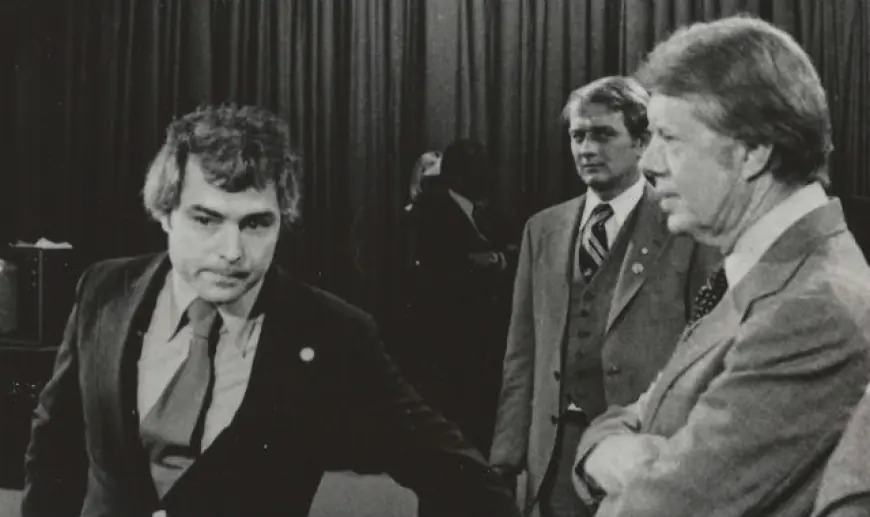Opinion: Remembering Jimmy Carter as a Brilliant, Truth-Telling and Honorable President
Jimmy Carter was a brilliant politician — a truth-teller who could also read his audience and phrase an answer that had universal appeal. This was a perfect attribute for a politician and a leader of a complex society.



After a successful career in broadcast journalism, which included helping to produce CBS Anchor Walter Cronkite’s coverage of the first manned landing on the moon and winning an Emmy for coverage of the Watergate scandal, I pretty much figured this was the top of the mountain.
I was a senior producer, making a hefty salary and getting among the best of news assignments. Truth-to-tell, though, I had begun to have a certain sense of déjà vu — the same old stuff, year after year.
Then, at the suggestion of network TV colleague Ed Bradley, who was covering the nascent Jimmy Carter for President campaign, I took a phone call from the Jody Powell, the press secretary to the former governor of Georgia. At that time Carter was “Jimmy who?” and running a longshot campaign.
Powell confessed that he and Carter didn’t know much about television, other than what they had learned in the Georgia statehouse. Was it true that I was looking around for new challenges after working in TV news? And if so, would I be willing to come up to New Hampshire where Carter seemed to be gaining a foothold?
“Well, okay,” I said, “sure I’d like to meet y’all.” After Powell and I had a couple of drinks in the bar of the main press hotel in Manchester, Powell said, “Well, I guess you’d better meet the boss!” Soon, I was in the presence of the skeptically-faced Carter, who asked, “Since you are a TV guy, how would you change me?”
Truthfully responding that I would not change him — though lots of bystanders thought Carter mumbled too much — I said I would advise him on how what he said and how he acted would be received by the nation’s major media, print and broadcast. I figured that with a graduate degree in journalism and a successful career I could make that claim.
So, we were off. I was his advisor through all of the Presidential primaries of 1976, the historic debates with incumbent Gerald Ford, and the election in November. Jimmy Carter went from unknown to being chosen by the American people to be their leader.
In a prescient choice Carter had selected the balanced, rather brilliant Sen. Walter Mondale from Minnesota be his Vice-President. Weeks of interviews and careful thinking brought about a highly experienced and very competent group to be in his cabinet.
Then Jimmy Carter proceeded to the White House, duty-bound to live up to his promise, “I will never lie to you.” It was a phrase that had exceptional resonance in the wake of Richard Nixon’s resignation in disgrace just a few years before.
For the next three years I served as a special assistant to President Carter, helping with media relations and having particular duties in cultural realms, such as helping to produce broadcasts from the White House and working to help select leaders of such vital entities as the National Endowment for the Humanities and National Public Radio. It was satisfying work though at one meeting in the Oval Office to present a particular report, the President quietly (but glaring) said, “If that is the best you could have done, I could have done it myself.” He was probably right.
But we soon embarked on an 11-nation Presidential trip, meeting with leaders from the Middle East, India and around the world. I could not have imagined more exciting or vital work.
Carter’s public approval ratings were very high in the first year-and-a-half of his presidency. I thought a lot of that public appreciation came because he never refused to take on questions— not from the press or from the public or from any quarter. The President had a remarkable ability to provide an answer that was true and honest, but also highly political.
He was a brilliant politician — a truth-teller who could also read his audience and phrase an answer that had universal appeal. This was a perfect attribute for a politician and a leader of a complex society.
But then, as the third year of the Carter Presidency rolled around, there were rumblings that the boss was over-exposed — that he was taking too many questions and giving too many answers. Some thought he should be reverting to the tried-and-true politician’s approach of “messaging,” saying only a bit and not going too far out.
Some of us disagreed, thinking that Carter’s willingness to speak out was his greatest strength as a public presenter. But eventually Rosalynn Carter began to agree with others in and around the White House that “Jimmy was not being treated very well and he was losing appeal because he was over-exposed.”
I disagreed, but was overruled and eventually left my role as presidential assistant and moved over to the National Security Council, where I worked in fascinating circles on issues of foreign policy. But after nearly a year, the White House was gearing up for a re-election campaign and I could sense that my role was pretty much coming to an end. Needless to say, those three years were the most exciting time of my life. But at 35 years of age, I realized it was time for me to move on.
Now, with Carter being honored as the greatest post-presidential leader, we look back and remember that no Americans were lost in foreign military expeditions — something of a modern first. I’m proud of having helped in his election, and participated in what in retrospect was as a highly successful term.
Jimmy Carter was a great man — an honorable man — who accomplished so much for America and democracy in his 100 years.
Barry Jagoda, a La Jolla resident, was an award-winning journalist at NBC News and CBS News who later served in the White House as an assistant for President Jimmy Carter. His book about the Carter years is Journeys With Jimmy Carter and Other Adventures in Media.
What's Your Reaction?








































































































